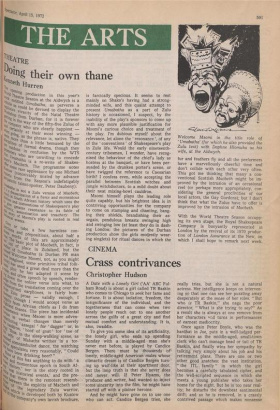THEAT RE t) c'ing their own thane theellneth Hurren ki r' °Pelting production
in this year's Theatre Season at the Aldwych is a "" rti.x. entitled Uba rnatha, as perverse a expitle as could be devised to display the Wereks,,,ive vivacity of the Natal Theatre P from Durban, for it is forever the •citg iri the way of the fifty-five Zulus of Rad clnPany who are clearly happiest — wherte,erta, iniY at their most winning — keel t0111g, as the phrase is, native. They dii!J'°re than a little bemused by the prel:oles of formal drama, though they tdone in confusion by the wTS :hat. -Lers v._ are unwilling to concede iegresU"Ltuatha is a re-write of Shakes, , Who offer Macbeth. The programme notes kastes„,°11) rare applesauce by one Michael ie.pett" (conceivably misled by advance etipfroill the Season's indefatigably t `',ie talent-spotter, Peter Daubeny): 4.10:Natiz . I i.e d q is not a Zulu version of Macbeth; illeth i ratnatisation of a fierce and momentous Wotlev,11 South African history which uses the :3 ' and conventions of Shakespeare's play , give Nti)ent greater resonance to its fable of stY, assassination and treachery. "e. ',Re • °rY Of Msomi's play is rooted in real rital events. ,. Give At'ittin,, Or take a few harmless conC"8 and prepositions, about half a , illiketrds of this are approximately oasic plot of Macbeth, in fact, is 410-" of place in Zululand, but the L4ttledi. \°xf, Urriabatha (a Durban PR man L4ve .11," elcome Msomi, not, as you might nt)11,-,agined, some primitive tribal folktie h-igs used a great deal more than the „),,t: he has adapted it scene by hlg dou74 often speech by speech, renderthe nobler verse into what, to "Insis;v111 the translation coming over the jtiset1 earphones, is fairly humProse — validly enough, I 1411)ily-f though I would accept verse as Lihr: „`r°111 African chiefs as I do from hnl4s„.'" thanes. The piece has incidental nes"'eints When Msomi is more adven'"bst' '11 verbal changes than merely the ILlitin,, 'ass ' ' for ' dagger' or, in , heogoafi of heogoafi of 'Itg.' T'klu goat' for 'toe of in the f sleep-walking scene, as f sleep-walking scene, as ' in,ted n 0, Mabatha writhes in a tor'Ior OnTharnbulist dance, the watching 11111‘evslpec0lates very reasonably, "Could Ne, e been drinking beer?" Of this • t do with 'a is has anything 0 Of this • t do with 'a is has anything 0 ltgii , ld rnoinentous epoch in South A i r' ltgii , ld rnoinentous epoch in South A i r' f l' 'Ist°rY,' i nor is the story rooted n /•tii -eal e historical events,' and the prethere is the remotest resembIv 41%e "een the exploits of Macbeth anr,d N iti° t-huich is developed both by Kustow the legendary Zulu warrio e e°TriPany's own lavish brochure, is farcically specious. It seems to rest mainly on Shaka's having had a strongminded wife, and this quaint attempt to present Umabatha as a part of Zulu history is occasioned, I suspect, by the inability of the play's sponsors to come up with any more plausible justification for Msomi's curious choice and treatment of the play. I'm dubious myself about the relevance, let alone the ' resonance ', of any of the ' conventions ' of Shakespeare's play in Zulu life. Would the early nineteenthcentury tribesmen, I wonder, have recognised the behaviour of the chief's lady as hostess at the banquet, or have been persuaded by the drunken porter's scene, or have twigged the reference to Caesarian birth? I confess even, while accepting the parallel between Scottish witches and jungle witchdoctors, to a mild doubt about their neat mixing-bowl cauldron. Msomi himself plays the leading role quite capably, but his brightest idea is in contriving opportunities for the company to come on stamping and chanting, banging their shields, brandishing their assegais, pendulous breasts swinging high and swinging low (at least they do in dashing London: the pictures of the Durban production show the girls modestly wearing singlets) for ritual dances in which the Welcome IVIsomf in the title role of Unuxbatha' (for which he also provided the Zulu text) with Daphne Hlomuka as his wife, at the Aldwych.
fur and feathers fly and all the performers have a marvellously cheerful time and don't collide with each other very often. This got me thinking that many a conventional Scottish Macbeth might be improved by the intrusion of an occasional reel (or perhaps more appropriately, considering the general proclivities of our local actors, the Gay Gordons); but I don't think that what the Zulus have to offer is improved by the intrusion of Macbeth.
With the World Theatre Season occupying its own stage, the Royal Shakespeare Company is buoyantly represented in London by the revival of its 1970 production of London Assurance at the New, on which I shall hope to remark next week.


































 Previous page
Previous page